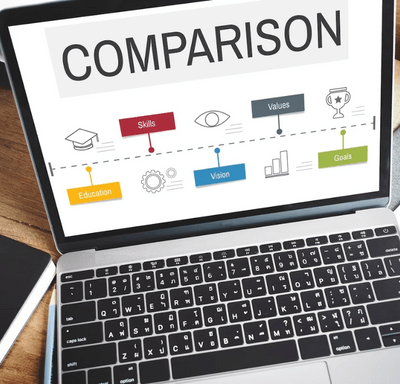
About us
Our Services
Our Expertise
Our Experience
Follow us
Why e2logy?
- We strive to provide superior customer service and ensure that every client is completely satisfied with our work.
- Our engineers are trustworthy, dedicated, and experienced and will go the extra mile to solve your IT issues.
- We are committed to delivering outstanding, cutting-edge IT solutions that add real value that goes beyond what is expected.

Drupal vs WordPress: Which is the right option for your website?

You have a lot to consider when choosing a CMS platform or changing your existing one. You should mull over the decision of what platform you should use for your website because it is the foundation of your website. The number of CMS options available makes it difficult to pick the right one for your business. It seems there is an advocate for Drupal for every advocate for WordPress.
It may seem difficult at first to choose a winner between WordPress and Drupal and figure out which one is the best fit for your project. Our goal is to help you make the best decision for your organization or business by breaking down the pros and cons of each platform.
Let’s begin by introducing both platforms briefly.
What is Drupal?
You can build complex websites and other web projects using Drupal, a free, open-source CMS. Blogs, personal or business websites, forums, online shops, intranets, and social networks can all be created with CMS. Although Drupal is suitable for novices and professionals alike, it lends itself more to experienced web designers and programmers. To build a social networking site from scratch, you’d have to have some technical skills.
Besides content management, Drupal also supports collaborative authoring, podcasts, image galleries, and peer-to-peer networking. Modules allow easy extensions, but even though everything sounds very similar to WordPress, there is still a very important difference between the two.
There hasn’t been a great deal of change over the years in the basic features of WordPress and Drupal, even though the following video shows older versions. This makes the comparison applicable to the new versions of both CMS.
What is WorPress?
Since 2003, WordPress has been the most demanded CMS across the world for its free and open-source nature. With almost 42.8% of websites on the Internet powered by WordPress, it is known to be preferred by individuals and organizations for website development.
WordPress simplifies website management, content creation, and functionality by providing a large number of third-party plugins. The website’s back end is easy to navigate thanks to an interactive dashboard that makes it easier to move around.
The easiest way to create a website is with WordPress since it requires no coding, manuals, or limitations.
Drupal vs WordPress: Which is the right option for your website?
Ease of use
An additional difference between the two platforms is their ease of use. People generally believe that WordPress is more manageable and easier to learn than other platforms. Even though Drupal has become more user-friendly in more recent versions.
Ease of using Drupal
The learning curve for Drupal developers, even for beginners, can be steep. Despite its ease of use, Drupal can be difficult to learn. As soon as you get used to the multiple dropdowns and how they are organized, the user interface is easy to navigate. Due to the aforementioned focus on becoming more user-friendly, the Layout Builder has been introduced in Drupal 8 to make editing and building content easier.
In general, Drupal does not require custom coding to make your website look and function according to your specifications despite expanding themes and modules.
The ease of using WordPress
Installation of WordPress takes only a few minutes, and even a beginner can get the hang of it within minutes. With their intuitive interface, non-programmers can easily create a blog with snappy options, create a WYSIWYG editor, leverage drag-and-drop functionality through third-party page builders, and choose from thousands of themes. With over 50,000 plugins available, you can extend functionality almost instantly without writing a single line of code.
You can also find a lot of WordPress resources online. Websites, blogs, videos, and forms are among these resources. Using this platform is the main goal of each of these courses.
Which is more secure? WordPress or Drupal?
A website needs WordPress plugins (3rd party add-ons) to extend its core platform with features like SEO, interactive sliders, social sharing, etc… because they are hacked more often, which causes them to have more vulnerabilities and require more frequent updates. Having fewer resources makes WordPress an easier and more attractive target because it is used by more companies.
Security is built into Drupal from the ground up. As a result of the extensive open-source community that actively adds, updates, and reviews its open-source code, some of the largest brands use Drupal. Since a vast amount of resources are poured into the open-source ecosystem for free, Drupal is more secure than most if not all platforms. The inherent advantages of open-source communities over privatized, corporate-owned platforms continue to prove that open-source platforms are more secure.
Optimizing for search engines
Regarding search engine optimization (SEO), no content management system (CMS) has a distinct advantage over another. The optimization process differs slightly between the two platforms.
SEO for Drupal
A built-in SEO tool is available in Drupal. A native feature of Drupal is caching, which allows the system to cache pages. Meta tags can be customized, title-based URL nodes can be created, and meta tags are based on titles. As well as supporting RDF, Drupal also supports the semantic web’s resource description framework (RDF).
It is possible to increase the SEO capabilities of Drupal by utilizing many modules. Modules such as XML Sitemaps, Redirect Modules, Alternate Hreflang Modules, Schema Modules, and Yoast SEO Modules are examples.
SEO for WordPress
With WordPress, you can easily implement different aspects of SEO with the help of plugins. There are many SEO plugins available, but Yoast SEO is one of the most popular. On-page SEO can be easily controlled with the Yoast plugin, which provides title, meta description, sitemaps, and open-graph data controls.
Ranking factors in SEO also include speed. The W3 Total Cache plugin could help you increase page load speed. Among the most popular WordPress caching plugins is this one. Every new plugin adds the possibility of breaking another plugin, but there is also the risk of conflicting with another plugin.
Which is Easier to Maintain? Drupal or WordPress?
Managing and planning a website often overlook maintenance. The ongoing maintenance of your website is as crucial as the initial setup of your website. Expanding functionality, updating add-ons, tweaking performance, and adding new features are all critical to the successful operation of your website.
Both website-building platforms require a learning curve to get the hang of, including their terminology. It becomes easier to maintain them once you’ve learned their terminology. To keep everything running smoothly in your business, it’s best to keep a list of items on your monthly checklist, along with a quarterly audit.
Drupal vs. WordPress: Community
WordPress Community
As so much of the internet runs on WordPress, the community has grown to be huge. There are also a lot of developers in the WordPress community that range in skill levels and backgrounds, so you shouldn’t have any trouble finding help if you run into difficulties.
Furthermore, freelance sites like Upwork and Fiverr have plenty of WordPress experts to assist you with quick problems.
Drupal Community
Drupal’s global community is significantly smaller, with just over a million users. Additionally, most Drupal users are developers, and problems and solutions discussed online often involve complex technical details.
Therefore, casual users won’t benefit much from them. You might be tempted to seek professional help if you cannot find a solution online, but Drupal can still be a challenge.
Due to the less popular CMS, developers get to charge more for their services since there are fewer developers.
Accessibility
Disability-friendly websites make it easier for people with disabilities to navigate, perceive, and contribute to them. Business websites, university websites, and government sites must be accessible.
Drupal Accessibility
When possible, Drupal core features are designed to comply with W3C, WCAG 2.0, and ATAG 2.0 guidelines. A retroactive retrofit of Drupal 6 accessibility standards was undertaken starting with Drupal 7 accessibility standards.
WordPress Accessibility
WP intends to completely comply with WCAG 2.0 AA whenever possible with the WordPress admin and themes bundled with it. Developers developing new themes and plugins receive guidance and best practices during the development phase from the accessibility team, which has created an accessibility handbook.
Conclusion
CMSs have different advantages, so choosing the right one can be challenging. It actually depends on the size of your website, from our experience. The two CMSs were designed for different audiences and purposes. Most of us don’t realize how little overlap there is between use cases.
There is only one type of content type in WordPress, which is all about visualization and responsive design.
With Drupal’s modular system and unique blocks that can be manipulated in a scalable way, it is designed as a database for handling multiple types of content.
You can build a website on both CMS platforms. Ultimately, you will find success by recognizing that these are tools instead of solutions. You ultimately can use these tools, leverage them effectively, and align your processes to your team’s capabilities which will determine the success of your endeavor.













